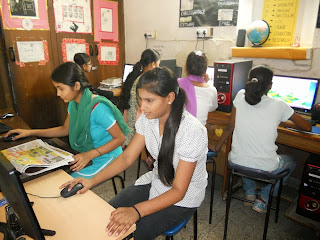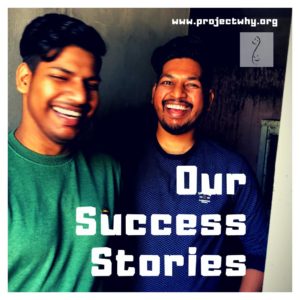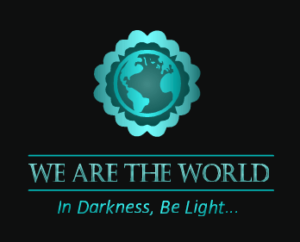It is easy to talk of one’s successes and achievements. It takes more guts to talk about failures and take responsibility for them. And yet it is the way in which you handle your failures that really defines you. Churchill said: Success is not final, failure is not fatal: it is the courage to continue that counts. You may wonder why I am writing about my failures today. Let me elucidate.
A few days back I got an email from a young Indian living in a foreign country. He and two others have decided that is was time to do something for their less privileged brethren and set up an organisation called Pankh. Their mission: to provide unskilled men and women with valuable skills, enabling them to build a sustainable source of income. I was touched by their ingenuous fervour and at the same time frightened by what awaited them as I had walked the same path with stars in my eyes more than a decade ago and it had/has taken all my wits and doggedness to survive in the world I had decided to enter and make mine. Charity, for want of a better word, is fraught with hurdles and sustainability is a far away pipe dream that I have still not been able to conquer. I had a long phone chat with one of the founders and tried to share my failures in the hope not to scare them, but make them aware of the possible pitfalls they may encounter. Quite frankly they would have to dare to jump in the void without a parachute and see whether they have the wings needed to fly. After I put down the phone it struck me that I have never really sat down and listed the failures that we have faced in the last 13 years and more importantly analysed the reasons behind these failures. Come to think of it people would learn more from our mistakes than our successes.
I will try and rely on a tired mind which is in its own chemo fog for the past months. Maybe one of the good side effects of my husband’s cancer would be to force myself to take a long walk down memory lane looking not for ah ha and eureka moments but for the blunders and disasters and above all the reasons therein.
One that comes straight to mind before even going into details is that most of our botch ups were either due to my being naive and easily taken in, or to my passionate nature that often acts before it thinks. Some of this could have been avoided if I had selected to have a professional team. But being instinctive and a little marginal by nature I wanted to select my entire team from within the community I worked for. This is a decision I have never regretted. The only minuscule flip side I now think occurred was that it took some time for my team leaders to understand that I was open to criticism and new ideas. Till they figured out that, they felt compelled to do whatever I said even if they in their hearts knew it would not work. Once they crossed the imaginary barrier they have guided me and made sure I do not make more boo boos! Today they have a free hand in running the day-to-day activities and do it better than I could have dreamt of. I must admit I have given up my zany ideas and gone by their wisdom.
But that does not mean it has all been smooth sailing. We have had some difficult times where staff hastily recruitedwere manipulated by local politicos and wily trade unions and got us into trouble. We came out of these thankfully almost unscathed.
The one thing I have found difficult to accept as it went against the grain of my beliefs was the lack of gratitude – for want of a better word – and at least acknowledgement from beneficiaries. I was brought up with a certain values, and expressing gratitude was one of them, and I guess I judged everyone from that platform. It was difficult for me to palate some of the unkind words and even insults from people one had helped in ample measure. It took me some time to understand where that came from. Actually it seems logical that people who have been denied the basics do want to grab as much as they can at any cost. When they feel let down they do nor have the wherewithal to deal with the situation in a calm manner. We work with people from what is unfortunately clubbed as ‘backward’ classes and they have an enormous complex and even anger towards those of us who have all. I guess it will take time for things to change. Till then one has to have the grit and patience to bear and keep smiling. What one has to understand is they are few among many who have stood by us, but humane nature makes you always look at the bad through magnifying glasses.
However our biggest failure has been in our sustainability efforts. Right from the outset making the project sustainable was first and foremost in our minds. Our mission statement did emphasise that we wanted to empower the community to take ownership of the project and run it themselves. This turned out to be utopian. Even getting one rupee a day from the beneficiaries proved impossible. It is difficult to assess why this happened. I guess the one thing that all NGOs have to encounter is the mistrust people have in you. The moment you say you run an NGO, you are looked at in a strange way. I understand that many NGOs have dubious intentions and are often set up for wily reasons, but to colour every one with the same black brush is not fair. Our biggest detractors have been the local politicos who tried every trick in the book and outside to make us pack our bags and go. This was of course after they tried to take us over by wanting to impose some of their kin in our Board. I can never forget the horrible man who use to visit us time and again first to ingratiate himself and then threaten us. At one time my short hair made me a Christian who had come to evangelise the flock. Then I became the one who received millions of dollars and pocketed most of them. This was in some way aggravated because of my foreign connection which resulted in many volunteers coming to my Project. Most of them were poorer then a church mouse, often friends of my daughter or kids of old friends but the politicos spread the rumour that each came with a bag full of greenbacks! There came a time when I use to make them open their bags in full public view and shout: no dollar, no dollar.
It would have been alright if it stopped at that. One would have thought they would give up. But no! Which set me thinking of the reasons that made one old woman trying to educate a bunch of children so dangerous. What comes to mind in hindsight is the fact that one was not only teaching children but empowering people from the day one. My decision to select to employ local people did not sit well with politicians who need vote banks they can manipulate. They need people to remain illiterate. I guess the watershed moment was when the local councillor realised that one of my students could speak and read English better than he could. And when some of my staff decided to exercise their right not to vote in an election, I was was branded enemy no 1. What followed was threats to me and my daughter and razing our school several times when we taught in parks and on street corners. Ultimately one wore them down, or rather made them change tactics.
When we decided to raise money from within the community be it by making nutritious snacks for children to carry to school, recycled paper copy books sold at a pittance or soap that we made from milled Pongamia seeds, our detractors roped in the wily trade unions that are set up by them and we were hauled to the labour court and it was nothing short of a nightmare. We finally managed to settle matters but our idea of raising money from the local community had to take a back seat. Even the one rupee a day was put on hold. So sustainability from within the community was not a valid option. I think it will take more than a generation to do that, particularly in urban slums. Coming to the city does give a chip on the shoulder and a misguided dream of getting a government job.
We then turned to what many NGOs day: card, candles, Diwali diyas, costume jewellery, paper bags etc and the market was the numerous melas and fairs organised by diplomats and expats. We soon realised that we could not compete with larger organisations and that every one seemed to be selling the same things in different shades. We spent more than we made so that too was abandoned. We then tried making chocolates and believe me they were excellent but again the rich and famous did not like the idea of buying chocolates made by slum people.
We also realised that such projects could never make us sustainable. At best we just made even. We needed a bigger project that would rake in big money. The increase of what is known as voluntourism or tourism with a heart made us zero in on building a green guest house the proceeds of which would run our education and other programmes. It would also enable us to take our students to the next level by teaching them skills linked to hospitality which is a growing market. It seemed such a great idea and we even had a promoter. We managed to find and purchase a piece of land, get a design and a business plan duly vetted . But then our promoter ditched us and in spite of our best efforts we were unable to raise the funds needed to build. After 3 years we had to bury this idea altogether. We were unable to find the funds. The amount needed was way beyond our league. The fault was perhaps ours, or rather mine, as I did not make PR an integral part of our organisation and did not have a fund raising wing. I have always felt uncomfortable with NGOs that are run like corporates. It maybe the way to go, but not mine. Maybe my inheritors will select this option.
It was back to the drawing board after a lengthy postmortem to figure out what had gone wrong. What was evident was that we did not have the profile needed to access large donors and our page 3 was practically non-existent. Maybe many were not convinced by hospitality as a sound sustainability option. Sustainability can only come from a market where the demand remains constant. When we conceived planet why we felt that a green and not-for profit guest house was something that would attract a niche market. I still think it would as in spite of the proliferation of guest houses at ever street corner, I have still not seen a totally green one, or one that is not a commercial enterprise. But this was not to be for us.
We now need to come up with plan B. For us it will have to be something that is low on investment and high on returns. What comes to mind is imparting skills at a competitive price. The skills have to be those that would help students get employment. They could range from IT skills and spoken English to technical skills like computer repair, electronic repair etc. For women stitching and beauty remain the preferred ones. We would need to do a market survey to find out what the good options are.
That is where we stand today. Unfortunately, due to personal reasons, 2013 turned out to be a sabbatical for me. I do hope that 2014 will get us the answers we seek.
It is the courage to continue that counts.





